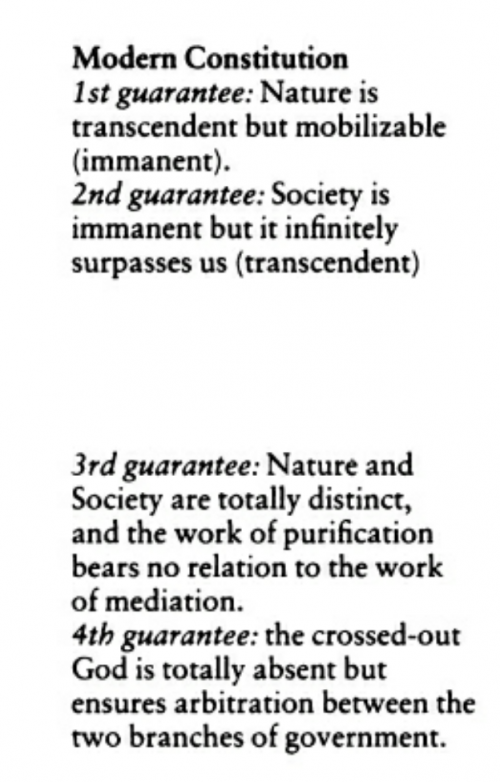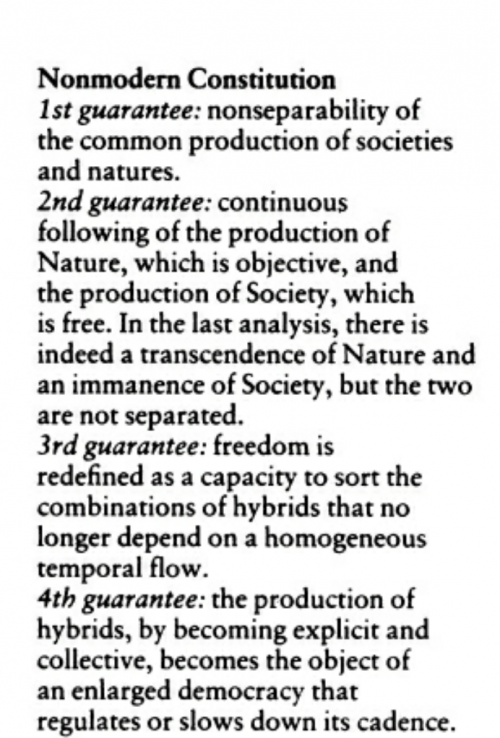The Nonmoderns
Posts in this series. The first posts in this series discuss some of the main terms used by Bruno Latour in We Have Never Been Modern. The book defines ours as the age of the Moderns, as contrasted with the Premoderns who came before; that’s the subject of the previous post. In this post I discuss Latour’s view of the conceptual underpinning of the Moderns, and his proposal to amend that constitution for Nonmoderns.
Latour describes the conceptual basis of the moderns by stating what he calls its constitution. The meaning of a constitution is its guarantees. Here are the four guarantees of the modern constitution, taken from figure 5.2, Kindle Loc. 2834:

The first guarantee is that Nature is transcendent, that is, it cannot be affected by us humans. At the same time, it is immanent, in the sense that once we discover something about nature, we can use it as we see fit. The second guarantee is that society is immanent, meaning we create it and can modify it, but at the same time it transcends any individual, and so it is at the same time transcendent. The third guarantee is that nature and society are totally separate things. Neither affects the other. The fourth guarantee is that the Crossed-Out God is present in our hearts for the purpose of deciding on moral issues that confront us, especially when they involve conflicts between society and nature.
Latour says that the hallmark of modernity in action is the combination of the conscious work of purification which proceeds from the third guarantee, and the unacknowledged creation of quasi-objects. That is underwritten by the third guarantee, which essentially says that everything is either culture or nature, society or science. By implication, there is no space for quasi-objects which are combinations of these two separate things.
I won’t go into all of the implications of this set of guarantees, which Latour works out over Chapters 3 and 4. This part of the book shows how pervasive these guarantees are, and how deeply we rely on them in the way we structure our approach to studying both science and nature and the way we create our society. He also discusses the reactions to modernity by the antimoderns and the postmoderns.
The antimoderns firmly believe that the West has rationalized and disenchanted the world, that it has truly peopled the social with cold and rational monsters which saturate all of space, that it has definitively transformed the premodern cosmos into a mechanical interaction of pure matters. But instead of seeing these processes as the modernizers do – as glorious, albeit painful, conquests – the antimoderns see the situation as an unparalleled catastrophe. Except for the plus or minus sign, moderns and antimoderns share all the same convictions. The postmoderns, always perverse, accept the idea that the situation is indeed catastrophic, but they maintain that it is to be acclaimed rather than bemoaned! They claim weakness as their ultimate virtue, as one of them affirms in his own inimitable style: ‘The Vermindung of metaphysics is exercised as Vermindung of the Ge-Stell’ (Vatimo, 1987, p. 184). Kindle Loc. 2475. [1]
The antimoderns are reactionaries. Latour dismisses the postmoderns as useless. [2] Latour calls for us to become nonmoderns, disavowing the Constitution of the Moderns and the anti- and post- criticisms. He proposes a new set of constitutional guarantees.

The point of this new constitution is to make explicit what we are actually doing. The first Nonmodern guarantee recognizes that the form of our society is in part generated by the things we create, including quasi-objects. Scientific inquiries are driven by what we as a society need or would enjoy far more than by scientists seeking knowledge for its own sake. The second Nonmodern Guarantee recalls the first two guarantees of the Modern Constitution, but recognizes that the transcendence of nature and the immanence of society are related.
The third Nonmodern Guarantee tells us that our society and the nature we are studying are a continuous whole with those of out forebears and of other existing and previous nature/cultures. We are not distinct and new, just the same human beings with different and shinier stuff and some cool new ideas. The fourth Nonmodern Guarantee says that the process of hybridization should be democratically controlled. In a nice turn of phrase, Latour refers to this democracy as the Parliament of Things.
Discussion
The first three Nonmodern Guarantees seem to me to make the processes of society explicit. We use science to create stuff. The processes of science are not some black box, but something we do for a purpose. Each breakthrough leads to exploitation, and it’s the exploitation that leads to quasi-objects. To take an example, the creation of the transistor was a breakthrough, but the exploitation of the breakthrough has recreated our society in fundamental ways.
The Fourth Nonmodern guarantee seems to me to be the most challenging. The founding principle of the US Constitution is the protection of property rights. One of those rights is ingrained in us from birth: I can do whatever I want to with my property. Only grudgingly do we allow laws to restrict that freedom, and not infrequently the Supreme Court strikes down those laws. Let’s examine what I hope is a neutral example: the dramatic increase in the use of liquid soap.
On one hand, liquid soap has benefits. It is easy to use, and possibly more effective than bar soap. It’s easy to replace and clean up in public lavatories, and it encourages and speeds up hand-washing. That’s also the case in medical facilities and kitchens.
On the other hand, liquid soap uses lots of water and one-time plastics. The water has to be purified, then shipped, so there is an increase in the use of fossil fuels for those purposes. One-time use plastics are made out of fossil fuels, have to be moved several times before final production, and then shipped. Then they wind up in waste dumps.
Liquid soap has become the norm for many of us, so much so that bar soap is becoming rare. Fun fact, the bar soap I like, Trader Joe’s Green Tea soap, has disappeared. I don’t think that was a total market choice. I think it was driven by capitalism’s urge to make money. It’s an example of the US way: Lever Brothers and Colgate-Palmolive can do what they want to with their money, including encouraging the use of liquid soap. They don’t have to and don’t care about any of the negative consequences of their actions. They make their decisions based strictly on the amount of money they can make.
The Fourth Nonmodern Guarantee says that we as a society have a right to weigh the positive and negative consequences of the uses of property. That’s a bold claim in the case of liquid soap. It’s a crucial claim in the case of climate change.
========
[1] I have no idea what that last quote means. I tried to figure it out, but I can’t, and strangely I don’t care.
[2] Here’s a taste:
The postmoderns have sensed the crisis of the moderns and attempted to overcome it; thus they too warrant examination and sorting. It is of course impossible to conserve their irony, their despair, their discouragement, their nihilism, their self-criticism, since all those fine qualities depend on a conception of modernism that modernism itself has never really practised. Kindle Loc. 2687.